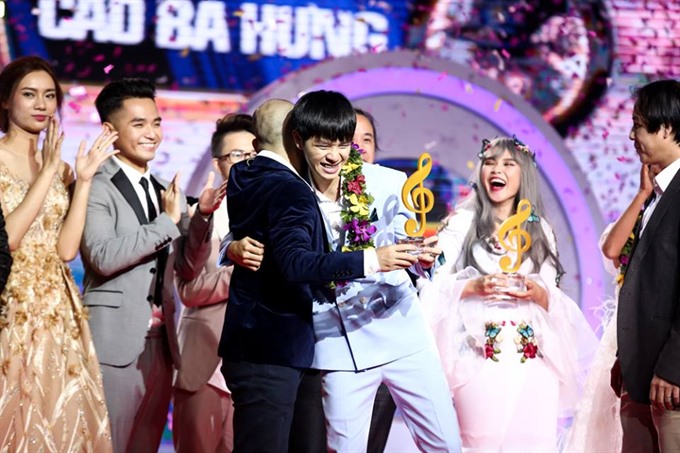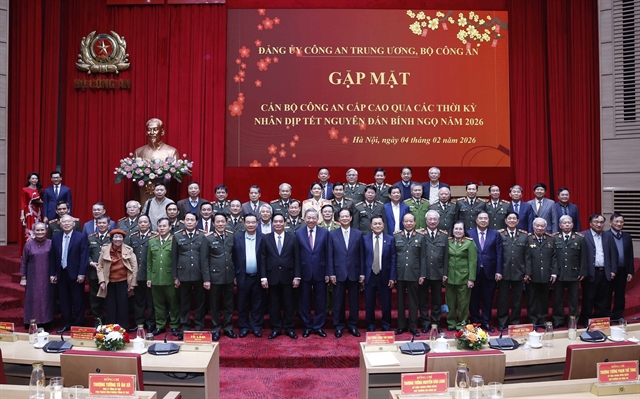

A teenager who is at high school in Ho Chi Minh City has been playing many musical instruments for ten years.
 |
| On his own song: Cao Bá Hưng won the Sing My Song Việt Nam reality show in January. |
A teenager who is at high school in Ho Chi Minh City has been playing musical instruments for ten years.
Cao Bá Hưng loves folk music.
When he played in a big competition, he wore traditional clothes.
The judges loved him for that.
by Hồng Vân
Cao Bá Hưng, in his teens, can play more musical instruments than the number of years he’s been on this earth.
If this is unusual, what really sets this young man apart is that he has chosen to focus his talents on something other than instruments – song writing.
The 18-year-old began learning to play instruments when he was just eight. Now, he can play the piano, the guitar, tỳ bà (four-stringed pluck instrument), đàn nguyệt (moon-shaped two-chord guitar) and đàn đá (lithophone), Vietnamese traditional drum and more than a dozen other instruments.
Hưng’s felicity with so many instruments was in keeping with his father’s wish that he becomes a talented player, but the son’s passion for composing and music production saw him deploy his muse in another direction – by writing songs.
His multiple talents caught the nation’s attention this January when he won the Sing My Song Việt Nam reality show.
He impressed the audience and all four judges as soon as he set foot on the stage, donning an áo dài, Vietnamese traditional dress and holding a fan in his hand.
His very first performance of Tương Tư (Lovesick) did not disappoint. The audience was charmed by the combination of Vietnamese folk melodies and rap lyrics.
“That a young person like Hưng is passionate about folk music will promote this genre meaningfully. This is more valuable than anything that we are trying to do to promote it,” said composer/judge Đức Trí.
“At 18, this [Hưng’s performance] is amazing. I really like the folk music in the composition. Even without the traditional long dress and khăn xếp (Vietnamese traditional headgear like turban worn usually when traditional music is performed), we still feel the folk music in you,” composer/judge Lê Minh Sơn commented after Hưng’s Tương Tư performance.
By creatively using traditional musical instruments like the Baranưng drum, flute and đàn nguyệt, Hưng incorporated Vietnamese folk music into almost all of his works performed at the Sing My Song contest, including Tương Tư (Lovesick), Kiều (Kiều) and Có vấn đề (There is a Problem). His songs were highly valued by the judges for the way the lyrics matched the language of folk music.
At a time when most youth seem more drawn to music from the West or Kpop, Hưng seems to stand out, not just for his love for folk music, but for his strong desire to popularise the genre, especially “among the youth”, as also attract public attention to Vietnamese literary works.
Hưng, currently a high school student in HCM City, was born into a family with a strong musical tradition, but says he was more fascinated with technology. By six, he had already learnt to work on Photoshop and design websites. However, it was not long before music claimed his undivided attention.
“When I live with music, I feel like I am being the fullest person I can be,” said Hưng.
Having begun to learn the piano when he was eight, Hưng was selected to study at the Guangxi Art Institute in China with a scholarship for young talents from the HCM City’s Department of Culture, Sports and Tourism, majoring in traditional music. He was just nine.
“My cousin and I travelled back and forth between Việt Nam and China by ourselves, flying from HCM City to Hà Nội and then taking the train on a journey of many hours.
“Actually, it is now, when I think back to that time, that I feel a bit scared. I was just nine. But then, I was just homesick,” Hưng told Việt Nam News.
In July last year, Hưng had chance to perform with Vietnamese artists in Russia under the Việt Nam-Russia Culture Exchange Programme.
“Though it was not a solo performance and audience may not have known me, it was such a pleasure that I had a chance to perform with leading artists of Việt Nam,” said Hưng.
Such experiences inspired him to stay true to his deeper motivations.
“I had to struggle quite a lot in shifting from playing instruments to composing. My parents wanted me to become a good instrument player and be able to play several instruments. When I was small, I set my own target to play music instruments for at least eight hours a day but eventually I could never make it (my mainstay),” he said.
Hưng had showed an aptitude for composing and choreographing when he was 13.
“When I was 13, I liked a girl two years older than me at school. I wanted to tell her this, but did not know how to do it so she would be really impressed. I sat by the piano and composed my first song.
“I then took all the courage I had in my hands, picked up a guitar and sang my song to her. I did not win her affections, but that was how I began composing.”
In 2014, Hưng and his four-member group Bốn Chị Em (Four Siblings) – a traditional music instrument band, competed in Việt Nam’s Got Talent, but did not go very far in the competition.
Besides singing, he also collaborated with other artists as a songwriter.
“I have long been fond of poetry and have written quite a few. But the readership for poetry is limited, and I love music. My focus is still music,” said Hưng.
“Most of my songs take their lyrics from my poems. My works are inspired mostly by my own stories and experiences. Tương tư in Sing My Song, which is about the feelings of a lovesick boy, is one of them.
“Through my compositions, I would like to bring Vietnamese literature and traditional folk music closer to audience, especially young people.
“I knew about Sing My Song even before it came to Việt Nam. To me, listening to songs performed by their own composer was wonderful. I loved the concept so much that I could not resist signing up for it.”
Hưng’s compositions for the show were mostly of folk music.
However, the teenage is also open to other music genres.
“I don’t think that an artist should pursue only one genre of music. For me, wearing hip-hop style clothes or having their hair dyed doesn’t mean those people lack appreciation for folk music. I myself also love modern music. Besides traditional music, I have written songs for rap, EDM and jazz,” he said.
Sometimes, Hưng is inspired to combine folk music with modern music. This way, the audience will receive folk music more easily, he feels.
“I am passionate about Vietnamese folk music, and using modern Western music in combination is part of the desire to share this passion with others, especially other young people.”
For now, after winning the contest, Hưng is avoiding the media, ’focusing on my studies, songwriting and music production projects only’. — VNS
GLOSSARY
If this is unusual, what really sets this young man apart is that he has chosen to focus his talents on something other than instruments – song writing.
If the young man is set apart, he is different to others.
Talents are natural skills.
Instruments are devices used to make music, such as guitars, drums, pianos and so on.
Hưng’s felicity with so many instruments was in keeping with his father’s wish that he becomes a talented player, but the son’s passion for composing and music production saw him deploy his muse in another direction – by writing songs.
Felicity means great happiness.
If you have passion for something you love it so much you do not mind how much time or money you spend on it.
To compose music means to write it.
Deploy means to make use of something.
Muse means inspiration. (See inspire further down.)
He impressed the audience and all four judges as soon as he set foot on the stage, donning an áo dài, Vietnamese traditional dress and holding a fan in his hand.
Donning means wearing.
His very first performance of Tương Tư (Lovesick) did not disappoint.
To be disappointed means to be unhappy about something you thought you would have been happy about.
The audience was charmed by the combination of Vietnamese folk melodies and rap lyrics.
To be charmed means to be made to feel delighted.
“That a young person like Hưng is passionate about folk music will promote this genre meaningfully.
To promote something means to say good things about it in the hope of making people more interested in it.
A genre is a type of music.
Even without the traditional long dress and khăn xếp (Vietnamese traditional headgear like turban worn usually when traditional music is performed), we still feel the folk music in you,” composer/judge Lê Minh Sơn commented after Hưng’s Tương Tư performance.
Headgear means clothing worn on your head, such as hats.
A turban is a hat made from cloth that is wrapped about the head.
By creatively using traditional musical instruments like the Baranưng drum, flute and đàn nguyệt, Hưng incorporated Vietnamese folk music into almost all of his works performed at the Sing My Song contest, including Tương Tư (Lovesick), Kiều (Kiều) and Có vấn đề (There is a Problem).
Creatively means using lots of imagination.
His songs were highly valued by the judges for the way the lyrics matched the language of folk music.
The lyrics to a song are its words.
At a time when most youth seem more drawn to music from the West or Kpop, Hưng seems to stand out, not just for his love for folk music, but for his strong desire to popularise the genre, especially “among the youth”, as also attract public attention to Vietnamese literary works.
A desire is a feeling of wanting to do something.
To popularise the genre means to make it popular, in other words make it such that many people want to listen to it.
Hưng, currently a high school student in HCM City, was born into a family with a strong musical tradition, but says he was more fascinated with technology.
Currently means now.
However, it was not long before music claimed his undivided attention.
Undivided attention means full focus.
Having begun to learn the piano when he was eight, Hưng was selected to study at the Guangxi Art Institute in China with a scholarship for young talents from the HCM City’s Department of Culture, Sports and Tourism, majoring in traditional music.
A scholarship is a special award given to someone who is believed to have hope, to help pay for their studies.
“But then, I was just homesick,” Hưng told Việt Nam News.
Homesick means longing for home.
Such experiences inspired him to stay true to his deeper motivations.
Motivations are the things that drive you to want to do things.
Hưng had showed an aptitude for composing and choreographing when he was 13.
Choreographing means designing the steps that are used in a dance.
“I then took all the courage I had in my hands, picked up a guitar and sang my song to her.”
Courage is the strength that is needed to do something that is scary.
“I did not win her affections, but that was how I began composing.”
Affections means fondness, or love.
In 2014, Hưng and his four-member group Bốn Chị Em (Four Siblings) – a traditional music instrument band, competed in Việt Nam’s Got Talent, but did not go very far in the competition.
Your siblings are your brothers and your sisters, no matter whether they are male or female.
“But the readership for poetry is limited, and I love music.”
Limited means ending somewhere and not being never-ending.
“My works are inspired mostly by my own stories and experiences.”
To be inspired means to be affected by something that makes you want to go out and do something positive.
“ Tương tư in Sing My Song, which is about the feelings of a lovesick boy, is one of them.”
To be lovesick means to act unusually, either because you are in love or because you want to be in love.
“Through my compositions, I would like to bring Vietnamese literature and traditional folk music closer to audience, especially young people.
Literature means writings for reading, especially books.
“I loved the concept so much that I could not resist signing up for it.”
A concept is an idea.
WORKSHEET
State whether the following sentences are true, or false:
© Duncan Guy/Learn the News/ Viet Nam News 2017
1. True; 2. True; 3. False; 4. True; 5. False.




